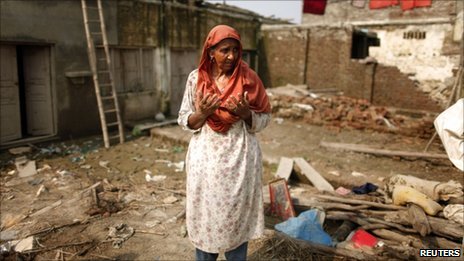 The European Union says it will spend an extra 30m euros ($39m) to fund emergency aid for victims of devastating floods in Pakistan.
The European Union says it will spend an extra 30m euros ($39m) to fund emergency aid for victims of devastating floods in Pakistan.
The announcement brings the total promised by the EU to 70m euros ($90m), and does not include money donated by individual EU member states.
It comes as the UK criticised the international response to the crisis, describing it as "woefully inadequate".
Meanwhile new flood warnings have been issued in some areas of Pakistan.
The authorities say as many as 20 million people are affected by the floods. The UN says six million desperately need emergency aid but most still have not received it. Tens of thousands of villages remain under water.
There are growing health concerns for those surviving without proper shelter, food or clean drinking water, three weeks after the country's worst natural disaster began.
Survivors have criticised the speed of the government's response to the disaster. There are also increasing reports of flood victims staging protests to demand help from the government.
Announcing the increase in aid, EU international aid commissioner Kristalina Georgieva said Pakistan was now facing "two disasters in one".
"In the northern part of the country... [the] internally displaced population has already been devastated by conflicts and they are now hit very hard again by the flash floods; this is where most of the loss of life has occurred.
"In the southern lowlands where the floods have expanded - especially in the last days - and where the country relies on agricultural land to feed its people, poor rural and vulnerable populations are affected by the slow but steady rise of the water."
The UK's International Development Secretary, Andrew Mitchell, visiting north-west Pakistan, said he felt Pakistani relief teams were doing well in getting supplies to many of the victims, but criticised the international community for being slow to tackle the crisis.
He warned that with more rain due, "the worst could still be to come". He said he hoped for a better response from the international community at a UN emergency meeting due to be held in New York on Thursday.
The UN has said it has now raised nearly half of the $460m (£294m) it needs for initial relief efforts.
In Pakistan, the government has sought to reassure international donors that funds to help victims of its devastating flooding will not fall into the hands of extremists.
Interior Minister Rehman Malik told the BBC the Taliban would not be allowed to take advantage of the crisis to increase its support.
Mr Malik said he was satisfied that the government had coped with the initial response but that it had been overwhelmed by the scale of the crisis.
"What happened was never expected. In the history of the whole sub-continent there was never such a disaster," he said.
US Senator John Kerry, the head of the Senate Foreign Relations Committee, is also due in Pakistan to view relief efforts.
At a regional summit in Russia, President Asif Ali Zardari said "Pakistan will come out of this a stronger nation."
He was expected to stay for only a few hours after being criticised earlier this month for not returning home early from a trip to Europe to deal with the growing crisis.
Even as aid becomes the primary focus, there have been warnings of fresh flooding in some of Pakistan's provinces.
A series of towns in north-west Sindh, close to the border with Baluchistan, have been placed on high alert. Rising floodwaters, carried by the River Indus, are travelling south and are expected to hit the region soon.
UN officials say the floods are now covering an area the size of England. At least 1,600 people have been killed, with health officials warning the toll could rise as water-borne diseases spread.
Aid agencies say six million people are in need of immediate assistance but many have received no aid at all.
The distribution of supplies has been hampered by severe damage to the country's infrastructure, with roads and bridges washed away or blocked by landslides.
The UN has been struggling to raise the money it says is urgently needed for the immediate relief effort.
Spokesman Maurizio Giuliano told Reuters news agency there had been "an improvement" in donations, but added: "The challenges are absolutely massive and the floods are not over."
Unicef, the UN's children's fund, called for "an urgent effort" from donors, saying it needs $2m per day to provide clean water supplies.



